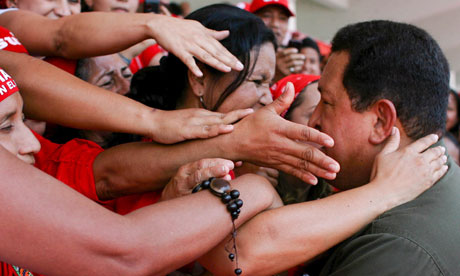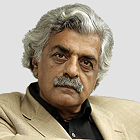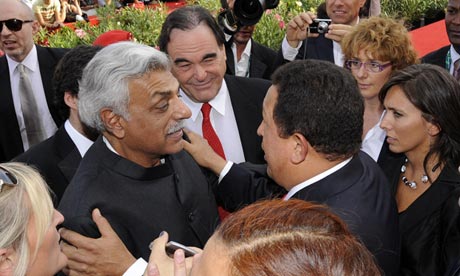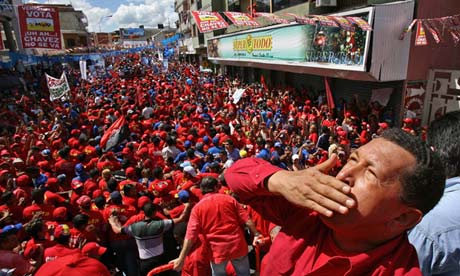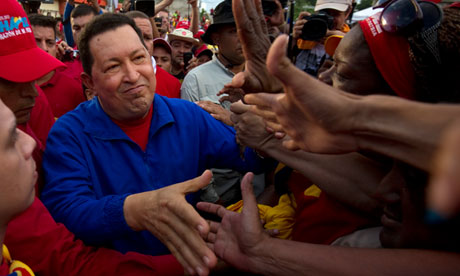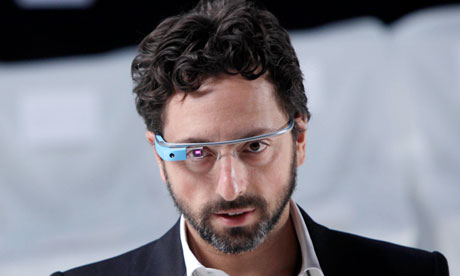Why Pakistan's lead bowler is like an Argentinian football midfielder
SB Tang in Cricinfo
March 10, 2013
In Argentina, they often speak of the importance of"the pause" both to their music and their football. On the football pitch, "the pause" is the moment when the designated playmaker, positioned between the lines of midfield and attack, places his foot on the ball, looks up, and pauses - in that moment, everything stops in the eye of the playmaker's mind. Out in the physical world, the expectant crowd holds their breath, waiting for the playmaker to pick out a pass.
In that instant, all futures are possible. The playmaker - one man in a team of 11 - chooses the pass to play, the path to take. He and he alone authors the team's collective fate. Like a Jedi Knight, a good playmaker must be capable of seeing things before they happen - the angled run the centre-forward is about to make behind his marking defender, the surge down the touchline that the full-back wants to make to create the overload, and perhaps even which of his own advancing attackers the opposition's spare defender intends to cover.
Thus, one man carries the weight of his team's destiny on his shoulders. That is why, in Argentinian football, the designated playmaker, the wearer of the No. 10 shirt, occupies such a special cultural place - he performs a duty that is almost sacred in its importance.
Watching Saeed Ajmal run through the world's best batting line-up in the second Test at Newlands last month, my mind turned to a different kind of pause - that in Ajmal's bowling action. Like most spinners, he approaches the crease at a smooth, comfortable canter, but unlike most spinners, just before he releases the ball, he pauses for a fraction of a second - like a claymation character in a Wallace & Gromit film - instead of driving his non-pivoting leg through the crease in one fluid motion, as the coaching manuals recommend.
However, there is a purpose behind this pause, a method to the seeming madness: the pause strips the batsman of one of his primary tools of attack and defence - his feet. Ordinarily a batsman using his feet to come down the pitch to a spinner will start his move just before or after the spinner releases the ball. By pausing just before the point of release, Ajmal makes it more likely that he will be able to see the batsman start to move before he releases the ball (thereby enabling him to change his delivery accordingly) and, more importantly, makes the batsman believe that Ajmal will be able to see him coming and adjust his delivery accordingly. This in turn causes the batsman to decide not to advance down the wicket at all, thereby removing a crucial weapon from his armoury.
In many ways phenomena like the pause are as characteristic of Pakistan's cricket culture as of Argentina's football culture. If Ajmal had suffered the misfortune of being English, there can be little doubt that the distinctive pause in his bowling action, not to mention his doosra, would have been coached out of him. As Maurice Holmes, the English mystery spinner unjustly hounded out of the English professional game at the age of 22, explained: "There will always be the English view, that something different is not necessarily something good. There are people who tend to take the traditional view that things can and should only be done in one way."
By contrast, in Australia and on the subcontinent, the finest cricketers are largely self-taught and allowed, if not encouraged, by their coaches to do what comes naturally to them, to trust their homespun techniques, to express their unique and abundant god-given talents. As Muttiah Muralitharan explained to the Cricketerrecently: "In Sri Lanka we find so many unique bowlers because we bowl naturally and are not over-coached." In Australia, Shane Warne had in Terry Jenner a coach and mentor who gave him the freedom to bowl naturally, even when that involved a substantial deviation from technical orthodoxy.
| Ajmal simultaneously functions as both strike bowler and workhorse, artist and blue-collar labourer | |||
At this moment Ajmal is 35 years of age and at the very peak of his powers. At Newlands he produced match figures of 10 for 147. The number and identity of the wickets were impressive in themselves, the exquisite manner of their extraction even more so. During South Africa's successful final-innings chase, Jacques Kallis, arguably the finest allrounder in history, and Faf du Plessis, among the form batsmen in world cricket, were left pinioned to their crease, like the hapless, scripted victims of a WWE cage match, after being trapped plumb in front by flat, fast offbreaks. Indeed, such was the thrall in which Ajmal held the South African batsmen, we were treated to the sight of AB de Villiers doing a decent Mesut Özil impersonation, his eyes nearly popping out of his skull as he tried to decipher one of Ajmal's deliveries from the non-striker's end.
The comparison of the pause in Ajmal's bowling with the pause in Argentinian football is apposite in several respects, not least of which is the nomenclature: in Argentina, the designated playmaker is known as theenganche - literally, "the hook". How apt. For Ajmal, like all masters of the art of spin bowling, doesn't just reel in his hooked catch - no, he personally baits the hook, dangles it before his intended catch, induces the bite and then gleefully reels in his victim.
There is no better example of this than his dismissal of Hashim Amla in the second innings at Newlands. Amla was well set and cruising serenely on 54 not out, having helped steer South Africa to 146 for 3, within touching distance of their victory target of 182. Ajmal tossed one up, wide of off, nice and high above Amla's eyeline, giving him the false comfort of off-driving him for four - and the crowd the opportunity to derive aesthetic pleasure from the shot. Ajmal's next ball was just a tad higher and a fraction slower. Not even a batsman of Amla's class could resist such a delectable temptation. He unfurled his gorgeous, trademark, flourishing cover drive… and connected with nothing but air. The ball, a conventional offbreak dropping steeply, sailed through Amla's wide open gate and clipped the bails over middle and off. Amla, as good a batsman as there is right now, was left floundering and grasping for something just out of his reach, like a child straining on tiptoe to reach a jar of lollies stored on the high shelf in the kitchen.
Much like the enganche, in the moment of the pause, Ajmal carries the enormous weight of his team's fate, if not on his shoulders then certainly in his long, supple sculptor's fingers. Ajmal is not quite the sole wicket-taker in the way that the enganche is the sole creator, but there is no doubt that in the current Pakistan Test XI he is far and away the primary wicket-taker. Ajmal took took ten of the 16 South African wickets that fell in the Cape Town Test match. When Pakistan beat the world's then No. 1 Test team in the UAE in 2012, he took 24 of the 60 English wickets that fell. At Newlands, the only bowling support that Pakistan could muster for Ajmal came in the form of a 34-year-old "fast-medium" opening bowler who bowls slower than Australia's current wicketkeeper; a raw, no-ball prone, seven-foot-one-inch giant making his Test debut, and a solid one-day bowler whose Test bowling average, after nearly 50 Tests, remains stuck in the mid-30s.
Thus the comparison of Ajmal with the enganche is inapposite in one crucial respect. The enganche in the classic Argentinian 4-3-1-2 formation is neither a leader nor a hard labourer; rather, as Hugo Asch put it, he "is an artist", "a romantic hero, a poet, a misunderstood genius with the destiny of a myth" who "only works under shelter, with a court in his thrall and an environment that protects him from the evils of this world". Indeed, that is the very purpose of the 4-3-1-2 formation - to protect the enganche. The bank of three behind him performs the hard physical labour of tackling, running, chasing and harrying for him, so that he is free to create art. Leadership is provided not by the enganche, but by hard-running, hard-tackling holding midfielders, such as Javier Mascherano in Argentina's 2010 World Cup team, or robust defenders, such as Roberto Perfumo in Argentina's 1966 World Cup team.
Ajmal, by contrast, is the very definition of a leader and a hard labourer. There are no other world-class bowlers in the current Pakistan Test XI to carry his water for him. He simultaneously functions as both strike bowler and workhorse, artist and blue-collar labourer.
When he claimed his sixth South African first-innings wicket at Newlands Test with a classic offspinner's delivery - a slower, flighted offbreak pitching well outside the left-hander Dean Elgar's off stump, which invited the drive and duly drew the edge to slip - Ramiz Raja said on commentary: "He's a champion, Saeed Ajmal."
That he is.
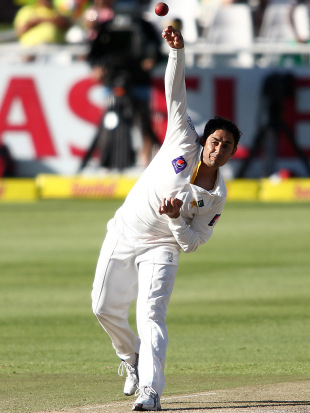


 5 Comments
5 Comments